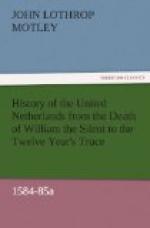Thus the civil war in France—an indispensable part of Philip’s policy— was to be maintained at all hazards; and although the ambassador was of opinion that the most Christian King was sincere in his proposition to invade England, it would never do to allow any interval of tranquillity to the wretched subjects of that Christian King.
“I cannot doubt,” said Mendoza, “that the making of this proposal to me with so much warmth was the especial persuasion of God, who, hearing the groans of the Catholics of England, so cruelly afflicted, wished to force the French King and his minister to feel, in the necessity which surrounds them, that the offending Him, by impeding the grandeur of your Majesty, would be their total ruin, and that their only salvation is to unite in sincerity and truth with your Majesty for the destruction of the heretics.”
Therefore, although judging from the nature of the French—he might imagine that they were attempting to put him to sleep, Mendoza, on the whole, expressed a conviction that the King was in earnest, having arrived at the conclusion that he could only get rid of the Guise faction by sending them over to England. “Seeing that he cannot possibly eradicate the war from his kingdom,” said the envoy, “because of the boldness with which the Leaguers maintain it, with the strong assistance of your Majesty, he has determined to embrace with much fervour, and without any deception at all, the enterprise against England, as the only remedy to quiet his own dominions. The subjugation of those three kingdoms, in order to restore them to their rightful owner, is a purpose so holy, just, and worthy of your Majesty, and one which you have had so constantly in view, that it is superfluous for me to enlarge upon the subject. Your Majesty knows that its effects will be the tranquillity and preservation of all your realms. The reasons for making the attempt, even without the aid of France, become demonstrations now that she is unanimously in favour of the scheme. The most Christian King is resolutely bent—so far as I can comprehend the intrigues of Villeroy— to carry out this project on the foundation of a treaty with the Guise party. It will not take much time, therefore, to put down the heretics here; nor will it consume much more to conquer England with the armies of two such powerful Princes. The power of that island is of little moment, there being no disciplined forces to oppose us, even if they were all unanimous in its defence; how much less then, with so many Catholics to assist the invaders, seeing them so powerful. If your Majesty, on account of your Netherlands, is not afraid of putting arms into the hands of the Guise family in France, there need be less objection to sending one of that house into England, particularly as you will send forces of your own into that kingdom, by the reduction of which the affairs of Flanders will be secured. To effect the pacification of the Netherlands the sooner, it would be desirable to conquer England as early as October.”




